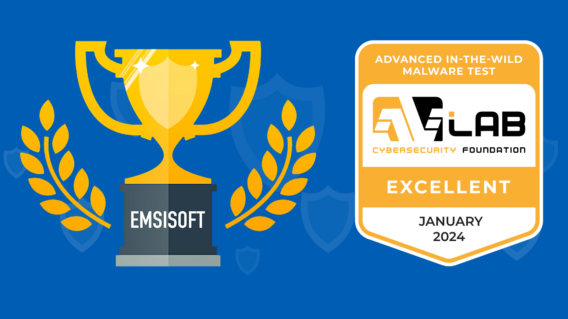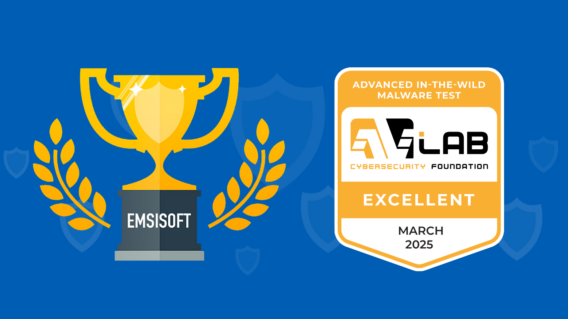Emsisoft Excels in AVLab Cybersecurity Foundation’s January 2024 Advanced In-The-Wild Malware Test

The Advanced In-The-Wild Malware Test by AVLab Cybersecurity Foundation rigorously assesses security products against real-world threats. The January 2024 edition underscored Emsisoft Enterprise Security’s outstanding performance, emphasizing its strong defense and rapid response.
Understanding the Test
AVLab Cybersecurity Foundation’s methodology for the January 2024 test was comprehensive, involving the capture of malware from diverse sources to ensure a wide range of threats. The test focused on both pre-launch and post-launch detection rates, emphasizing the importance of stopping malware before it can execute its payload, as well as the ability to eliminate threats that manage to initiate effectively.
A notable addition to this edition was the inclusion of Living off the Land Binaries (LOLBins) statistics, shedding light on how legitimate Windows components can be exploited by cybercriminals. This aspect of the test underscores the complexity of modern cyber threats and the need for security solutions to be adept at identifying and mitigating such stealthy tactics.
Metrics of Success in Cybersecurity
Before diving into the results, let’s outline the key performance indicators that define success in cybersecurity, as assessed in AVLab Cybersecurity Foundation’s tests:
- Detection Rate: The core measure of a security solution’s effectiveness in identifying threats. A high detection rate indicates a product’s precision in distinguishing and blocking malicious activities.
- Pre-launch vs. Post-launch Detection: Differentiates between threats blocked before activation and those neutralized post-activation, highlighting the importance of multi-layered defense mechanisms.
Emsisoft’s Standout Performance
Incorporating these metrics, Emsisoft’s achievements in the January 2024 test were notable:
- Achieved a 100% detection rate, blocking all 380 tested malware samples, showcasing its comprehensive threat coverage.
- Demonstrated impressive pre-launch and post-launch protection capabilities, with respective scores of 52.89% and 47.11%, ensuring threats were effectively managed at all stages.
Emsisoft Enterprise Security delivered a stellar performance in the test, and these results are particularly impressive given the diverse nature of the threats, including malware hosted over both HTTP and HTTPS protocols.
The Importance of Pre-Launch and Post-Launch Protection
The test results provide valuable insights into the significance of both pre-launch and post-launch protection. Emsisoft’s high scores in both categories demonstrate its comprehensive approach to cybersecurity, ensuring robust defense mechanisms are in place to block threats at every possible stage.
The inclusion of sandbox data, indicating the number of malicious changes made to the system without antivirus protection, further emphasizes the critical role of effective security solutions in maintaining system integrity and preventing unauthorized modifications.
Innovations and Methodology Updates
AVLab Cybersecurity Foundation’s commitment to transparency and ongoing improvement is evident in the updates to its testing methodology and backend processes. Adjustments such as the introduction of a delay in file downloads and the refinement of data sorting contribute to the accuracy and reliability of the test results. These enhancements ensure that each security solution is evaluated under consistent and fair conditions.
Emsisoft Enterprise Security + EDR
Robust and proven endpoint security solution for organizations of all sizes. Start free trialEmsisoft’s Continuous Evolution
Emsisoft’s success in this AVLab Cybersecurity Foundation test as well as previous tests is a testament to our current capabilities as well as an indication of our commitment to evolving alongside the threat landscape. By incorporating feedback from tests like these and adapting its strategies accordingly, Emsisoft ensures its users benefit from cutting-edge protection that’s always a step ahead of cybercriminals.


